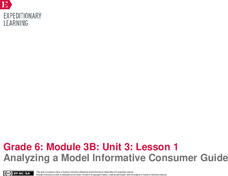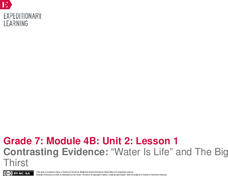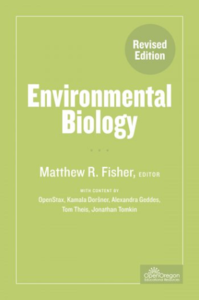EngageNY
Researching Information about Sustainable Fishing
Go fish! Scholars continue using their research skills to find factual information to use in their consumer brochures about overfishing. They work in triads to research information about sustainable fishing practices and share their...
EngageNY
Analyzing a Model Informative Consumer Guide
What do consumers need to know about overfishing before buying fish? Scholars consider the question as they prepare for their performance task, which is to create a consumer guide for people about purchasing fish responsibly. After...
EngageNY
End of Unit 2 Assessment, Part 1A: Fishbowl on Better Use of Water in Agriculture
Just keep swimming! Pupils participate in a Fishbowl discussion, sitting in two concentric circles and alternating between speaking and listening roles. During the discussion, they defend a claim about the best way to begin managing...
EngageNY
Contrasting Evidence: “Water Is Life” and The Big Thirst
Sometimes differing arguments support the same claim. Scholars complete a graphic organizer comparing how two authors support the claim that people need to better manage the world's water supply. Pupils also complete a graphic organizer...
EngageNY
Local Sustainable Food Chain: Determining Cascading Consequences Using The Omnivore’s Dilemma
What are the consequences of the local, sustainable food chain? Research teams explore the question as they review Michael Pollan's The Omnivore's Dilemma. The teams complete Cascading Consequences charts and then choose research topics...
Purdue University
The Great Clearcut Controversy
Urban development and habitat retention are often at odds. A three-part lesson examines the pros and cons of forest clearcutting. Learners review data and characteristics of a specific mammal to make conclusions about the effect...
National Wildlife Federation
Fossil Fuel Extraction Activity
Extracting oil is more difficult than many think! Learners work together and get hands-on as they represent oil companies drilling for oil by simulating oil extraction using beans. They identify the challenges faced in using...
Open Oregon Educational Resources
Environmental Biology
Everyone has a responsibility to take care of the environment. Give learners a sense of our environmental concerns with a complete course on environmental biology. The textbook resource includes instruction on topics such as population...
WE Charity
High School–Module 2: Circular Economy and Nature
Everyone's heard the popular slogan reduce, reuse, recycle, but there may be a better way to talk about sustainability. Using the second lesson from the five-part WE Are Innovators—High School Modules series, learners explore issues...
WE Charity
High School–Module 1: Sustainable Innovation
What does it mean to have an innovative mindset? Pupils think outside the box with the first of five lessons from the WE Are Innovators—High School Modules set. Scholars read articles and watch videos about sustainable innovation, such...
WE Charity
High School–Module 5: Transportation Solutions
Planes, trains, and automobiles ... the abundance of today's transportation options comes at a hefty price. Using the fifth and final lesson plan from the WE Are Innovators—High School Modules set, pupils explore how modern...
WE Charity
High School–Module 4: Energy and Housing
What features make a home energy-efficient? Pupils attempt to answer the question with the fourth lesson from the five-part WE Are Innovators—High School Modules set. Scholars learn how certain building materials help save energy. Using...
WE Charity
High School–Module 3: Food Waste
Advances in packaging and refrigeration help keep food fresher longer. That's just one of the ways science is addressing global food waste. With the third of five lessons from the WE Are Innovators—High School Modules set, scholars use...
WE Charity
Elementary–Module 5: Transportation Solutions
How does transportation affect the environment? Using the fifth and final instructional activity from the WE Are Innovators—Elementary Modules series, scholars explore sustainable transportation. Pupils work in small groups to create...
WE Charity
Elementary–Module 4: Energy and Housing
Many innovators are working on solutions to address environmental problems like energy-inefficient housing. Scholars have an opportunity to develop their own strategies using the fourth of five lessons from the WE Are...
WE Charity
Elementary–Module 2: Circular Economy and Nature
How can people do their part to help protect the environment? Learners participate in an engaging jigsaw activity to discuss the causes and effects of pollution. Next, pupils develop their own innovative ideas to address an environmental...
WE Charity
Elementary–Module 1: Sustainable Innovation
Where would society be without the innovations of Thomas Edison or Steve Jobs? Scholars explore what it means to have an innovative mindset. Working in small groups, pupils design a product or service to help solve a social,...
California Academy of Science
Exploring the Impacts of Feeding the World
Approximately 50 percent of people in the world who are chronically hungry work in agriculture. While it seems counter-intuitive, the farther you live from a farm, the more food options are available. Scholars explore concepts related to...
California Academy of Science
Our Hungry Planet: Design Thinking Challenge
Scholars investigate an issue associated with food systems and design their own solutions. Working collaboratively, they follow each step in the design process to complete the 10th lesson of the 13-part Our Hungry Planet series.
California Academy of Science
Sustainable Water Solutions: Weighing the Pros and Cons
Switching indoor water fixtures to low flow reduces water usage by more than 45 percent. This and other solutions to reduce water usage have both pros and cons. Scholars view videos of different solutions, discuss them in small groups,...
California Academy of Science
Exploring Our Growing Need for Water
Pupils explore the amount of water people use in agriculture and for personal use. They compare water usage for various crops to that of raising animals before considering solutions for increased access to safe drinking water worldwide....
Kenan Fellows
Sustainability: Learning for a Lifetime – The Importance of Water
Water is essential for life—and understanding the importance of clean drinking water is essential in understanding sustainability! Show your environmental science class the basics of water testing and treatment through a week-long...
Henry Ford Museum
Sustainability: Environmental Management and Responsible Manufacturing
When you think about environmental sustainability, the Ford Motor Company probably isn't the first company to come to mind. A four-lesson unit introduces learners to the idea of sustainability and environmental stewardship. It describes...
Royal Society of Chemistry
Green Plastics—Chemistry Outreach
How do green plastics reduce waste and environmental pollution? Budding scientists create and test a variety of compounds used in green plastics during an insightful experiment. Beginning with startling statistics and ending with...

























